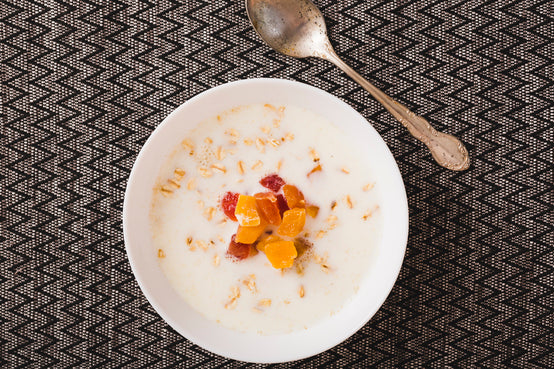
Weight Gain Ideas for Babies Using Dry Fruit Powder
Moms want everything to be perfect for their little bundle of joy; there’s no taking second chances, especially when it is about the baby's health. That’s why when they think their babies are underweight they go through a lot of effort to help their baby gain weight in a healthy manner.
One excellent way to do this is by incorporating dry fruit powder into their diet. Dry fruits are even recommended by doctors; these powders are rich in essential nutrients and can be a game-changer in promoting healthy weight gain for your little one. In this blog, let’s look at how we can use dry fruit powder to aid in healthy weight gain in babies.
Ragi Porridge
Ingredients:
Two tablespoons ragi flour (finger millet flour)
1-2 teaspoons dry fruit and nuts powder
Water or milk (as required)
A small piece of jaggery or 1 tsp. Honey (optional)
Instructions
Mix the ragi flour with water or milk to form a smooth paste, ensuring no lumps. Cook this mixture on low heat, stirring continuously to avoid lumps. Once the porridge thickens, add the dry fruits and nuts powder and mix well.
If using jaggery, add it while the porridge is still hot so it melts and blends well. This ragi porridge is a powerhouse of nutrients and is perfect for a healthy weight-gain diet.
This porridge combines the goodness of dry fruits with the goodness of millet. Millets are regarded as superfoods for babies and help with weight gain. These foods are rich in zinc and help improve immunity.
Nutritious dry fruit powder Milk
Ingredients:
1 cup milk (or formula milk)
1-2 teaspoons dry fruit powder
Instructions:
Take a cup of milk and 2 teaspoons of dry fruit powder.
Keep stirring and let it boil until the flavours are absorbed.
Your healthy, dry fruit milk is ready to be served.
This drink is the perfect alternative to plain milk; it is charged with nutrients and healthy fats, which help in gaining weight. It can be served to babies 12 months and older, and when starting, begin with ½ tsp of the powder and pay close attention to whether the baby shows any reaction.
You can increase the quantity after 3–4 days or a week if the baby is still not showing any allergic reactions. One or two servings per day is recommended for toddlers.
Fortified Oats Porridge
Ingredients:
Two tablespoons of oat porridge
1-2 teaspoons dry fruit and nuts powder
Water or milk (as required)
A pinch of cardamom powder (optional)
Instructions
Cook the porridge as you usually would, with water or milk. Once it's ready, mix in the dry fruit powder and a pinch of cardamom for flavour. This porridge is not only nutrient-dense but is also incredibly satisfying, making it perfect for breakfast or dinner.
Why Dry Fruit Powder
Nutrient-Rich
Dry fruit powder is a powerhouse of vitamins, minerals, healthy fats, and proteins that are essential for your baby’s growth and development. Combined with ingredients in our recipes, like milk, millet, and oats, they are converted into whole foods.
Easy to Digest
Powdered dry fruits and nuts are much easier for babies to digest and absorb their nutrients. Dry fruit powder ensures toddlers and babies get the maximum nutritional benefit without any digestive issues.
Versatile
This powder can be added to a variety of foods, making it easy to include in your baby’s diet without much effort.
Immune Boosting
Dry fruit powders are rich in antioxidants and essential nutrients; dry fruits and nuts help strengthen your baby’s immune system. The rich iron content in nuts and dry fruits will aid in avoiding anaemia and fighting off other diseases.
Including dry fruit powder in your baby’s diet can be an effective and simple way to promote healthy weight gain. These recipes are tasty, contain all the essential nutrients, and are easy to cook, making mealtime enjoyable for both moms and their little ones.
Before introducing new foods, consider consulting your paediatrician to ensure they are suitable for your baby. And while introducing new foods, be on high alert for any allergic reactions.